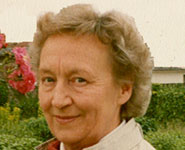Geography at Bristol has been, and remains, extraordinarily fortunate in those who run the School’s office, and none more so than in Margaret Reynolds, whose passing earlier this month we mourn. Margaret was a local girl: born Margaret Callaghan, the second daughter of a Bristol port worker, she was raised and went to school in Sea Mills. She left school at fourteen and trained locally as a secretary. Seconded in the later war years to the Ministry of Food (in North Devon) and then the War Office (in London), she honed those basic skills of shorthand, dictation and above all meticulous organisation which were to stand her in such good stead in the university world.
Widowed in her early thirties, she returned to her native Bristol determined to secure the future for her young daughter. She applied for a secretarial post in the University and was appointed by Professor RF Peel in 1964 to the Geography Department. Here she joined Betty Collins as second secretary in a rapidly growing part of the university. She was to work there for the next quarter-century, serving as senior secretary and administrator until her retirement in 1989. Together with Betty she saw through a sequence of office revolutions, from Remington uprights and Pitman shorthand through to IBM ‘golf balls’, computers and the word-processing revolution. It was a period of crucial change in roles as secretarial duties shifted in style and content towards wider administration.
Through all these changes Margaret remained unfazed, a centre of good sense and calm efficiency. She regarded the academic staff with a kindly exasperation that experienced ward sisters reserve for their younger registrars, and like TV’s Sir Humphrey, always had a solution tucked away in her meticulous office. Former undergraduates, grad students and staff, now scattered around the world, will have happy memories of Margaret’s long years in the Department. For them she represented continuity, a warm welcome home, and good practical advice. Sheer hard work and a phenomenal memory for detail made her indispensable: ‘Ask Margaret’ became the traditional response to so many queries.
Outside the University, Margaret was a tireless walker and lover of the English coast and countryside, never happier than in a strong gale. She read very widely and, with the late Mary Southcott, provided constant recommendations, especially on detective novels, both of them checking first – like film censors – that the novels were sufficiently ‘proper’ for innocent senior faculty to read. Donna Leon detective stories set in Venice were her particular favourite.
Margaret lost her courageous battle with cancer on 8 February 2012 and died just short of her 85th birthday at her home in Clevedon. A few days before her death and when still at St Peter’s Hospice she continued to show an interest in ‘her’ Department and to ask me about favourite ex-members from New Zealand, through Brazil, to Canada. She leaves a married daughter, Catherine, who – following in her mother’s administrative footsteps – worked in both the Foreign Office overseas and the Home Office. She is survived by her older sister who also served many years in the University’s School of Chemistry.
With Margaret’s passing we lose a much-loved and much-respected colleague, and for me a personal friend. We also honour a tradition of long and loyal University service that has been so much valued by generations of staff and students. She will be sorely missed and remembered with affection.
